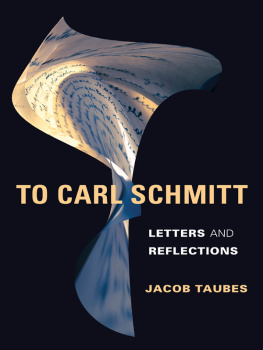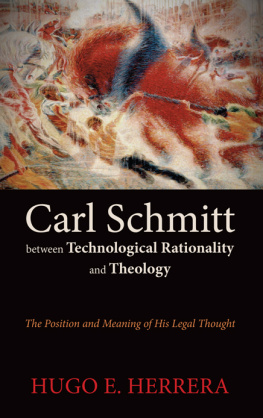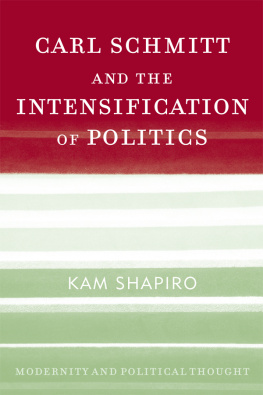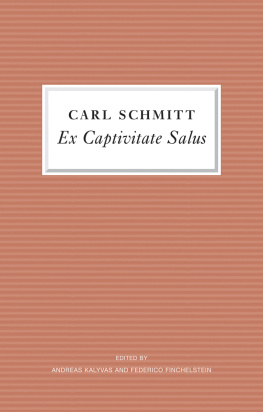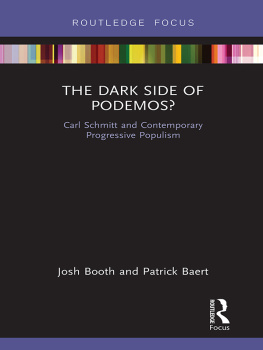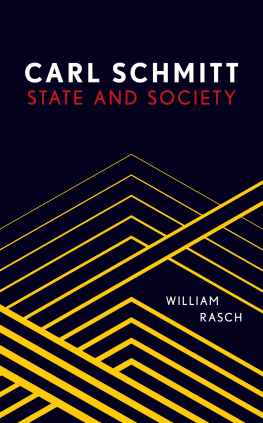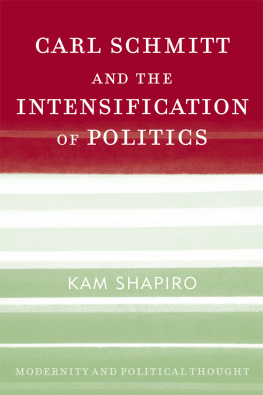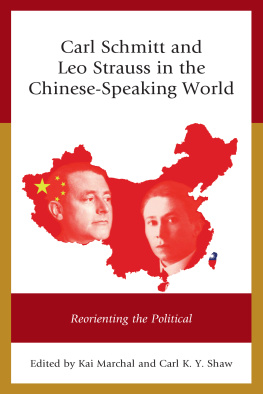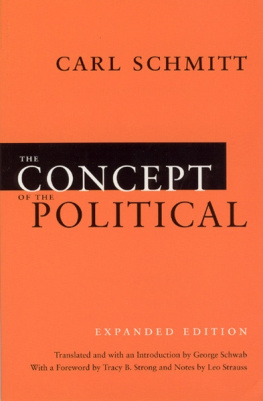TO CARL SCHMITT
INSURRECTIONS:
CRITICAL STUDIES IN RELIGION, POLITICS, AND CULTURE
INSURRECTIONS: CRITICAL STUDIES IN RELIGION, POLITICS, AND CULTURE
Slavoj iek, Clayton Crockett, Creston Davis, Jeffrey W. Robbins, editors
The intersection of religion, politics, and culture is one of the most discussed areas in theory today. It also has the deepest and most wide-ranging impact on the world. Insurrections: Critical Studies in Religion, Politics, and Culture will bring the tools of philosophy and critical theory to the political implications of the religious turn. The series will address a range of religious traditions and political viewpoints in the United States, Europe, and other parts of the world. Without advocating any specific religious or theological stance, the series aims nonetheless to be faithful to the radical emancipatory potential of religion.
After the Death of God,
John D. Caputo and Gianni Vattimo, edited by Jeffrey W. Robbins
The Politics of Postsecular Religion: Mourning Secular Futures,
Ananda Abeysekara
Nietzsche and Levinas: After the Death of a Certain God,
edited by Jill Stauffer and Bettina Bergo
Strange Wonder: The Closure of Metaphysics and the Opening of Awe,
Mary-Jane Rubenstein
Religion and the Specter of the West: Sikhism, India, Postcoloniality, and the Politics of Translation,
Arvind Mandair
Plasticity at the Dusk of Writing: Dialectic, Destruction, Deconstruction,
Catherine Malabou
Anatheism: Returning to God After God,
Richard Kearney
Rage and Time: A Psychopolitical Investigation,
Peter Sloterdijk
Radical Political Theology: Religion and Politics After Liberalism,
Clayton Crockett
Radical Democracy and Political Theology,
Jeffrey W. Robbins
Hegel and the Infinite: Religion, Politics, and Dialectic,
edited by Slavoj iek, Clayton Crockett, and Creston Davis
What Does a Jew Want? Arguing an End to an Artificial Conflict,
Udi Aloni
TO CARL SCHMITT
LETTERS AND REFLECTIONS
JACOB TAUBES
TRANSLATED BY KEITH TRIBE
WITH AN INTRODUCTION BY MIKE GRIMSHAW
Columbia University Press New York
Columbia University Press
Publishers Since 1893
New York Chichester, West Sussex
cup.columbia.edu
Ad Carl Schmitt. Gegenstrebige Fgung
copyright 1987 Merve Verlag, Berlin
Copyright 2013 Columbia University Press
All rights reserved
E-ISBN 978-0-231-52034-8
Library of Congress Cataloging-in-Publication Data
Taubes, Jacob.
[Ad Carl Schmitt. English]
To Carl Schmitt: letters and reflections /Jacob Taubes; translated by Keith Tribe.
p. cm.(Insurrections)
Includes bibliographical references.
ISBN 978-0-231-15412-3 (cloth: alk. paper)
ISBN 978-0-231-52034-8 (e-book)
1. Taubes, JacobCorrespondence. 2. Schmitt, Carl, 18881985Correspondence. 3. Political scientistsGermanyCorrespondence. I. Title.
JC263.T38A4 2013
320.53'3092dc23 | 2012035759 |
A Columbia University Press E-book.
CUP would be pleased to hear about your reading experience with this e-book at .
Cover image: (original photograph) Jan Bickerton / Trevillion Images
Cover design: Lisa Hamm
References to eb sites (URLs) were accurate at the time of writing. Neither the author nor Columbia University Press is responsible for URLs that may have expired or changed since the manuscript was prepared.
PUBLICATION OF THIS BOOK IS SUPPORTED BY A GRANT FROM
JEWISH FEDERATION OF GREATER HARTFORD
CONTENTS
A VERY RARE THING
MIKE GRIMSHAW
How can, how does one engage with To Carl Schmitt? For this slim collection of writings, comprising letters and lectures on Carl Schmitt by Jacob Taubes, is a fascinating volume that not only increases our knowledge of Taubes, it also demands a rethinking of the role of Schmitt in twentieth-century thought, in particular theology and philosophy. Most centrally, it forcesor I should say, in a Taubean-style polemic, should forcea reconsideration of what is meant, is undertaken, and eventuates when we use the term political theology to describe a particular intellectual and scholarly endeavor. For political theology of the twentieth century is so deeply intertwined with Schmitt that to undertake it is always, even if unknowingly or silently, to engage in, variously, a conversation, dialogue, debate, or argument with Schmitt. Jacob Taubes found himself in such an engagement from 1948 when he set out his questions and views in a letter that came to the attention of Schmitt. The letters and lectures in this volume chart, rechart, discuss, and attempt to explain at least part of this engagement.
A central recurring theme and self-questioning takes the form of an intellectual confession from Taubes, providing the background for how a Jewish scholar became a friend (Taubess term) of a jurist of the Nazi state. Just how this came to be is discussed throughout the collection and compels a rethinking of the influence of German thought on twentieth-century thought in the sense that to think philosophically in the twentieth century (and into the twenty-first) in the realms of politics, theologyand where they meet in political theologyis to think in the wake of Schmitt. As Taubes notes, even Walter Benjamin stated his debt to Schmitt.
The issues that arise out of this are complex and over the last three decades involve the turn to Paul as political theorist by not only Taubes but also those who have later done so, such as Badiou, Agamben, and iek, and the growing body of political Paul scholarship that follows. For Paul, as the one who claims the overcoming of law by grace, in effect could be argued to undertake the central sovereign act of exception in Western culture. Not that Paul is sovereign, but that Paulor at least Pauls Christproclaims the new sovereignty of grace over what becomes characterized (and, it can be stated, all too often caricatured) as the old sovereign God of law. Schmitts political theology in turn can be seen as what occurs when the Churchs pragmatic combination of grace and new law becomes secularized law, that is, when the secularized State replaces the Church as authority and now decides the exception without explicit reference to God. Yet God is always there, even when absent, dead, or discounted, for God is the silent reference of political theology, the supplanted sovereign of human politics.
Schmitts response to Taubess first letter and Taubess wrestling with how and when finally to respond provide a central focus and in turn raise issues for how we read Schmitt today. For this is a very rich resource and thus, as well as contextualizing both Taubes and Schmitt and their relationship, there are the wider issues of political theology, twentieth-century political and theological history, and the letter as a resource and text. As such this is also a glimpse into a lost world of conversation and thought that because of the Internet is gone. How many of us save our e-mails for the future? Indeed the e-mail itself seems to encourage a different style of communication, and this has an impact upon what could be called the contemporary history of thought. Letters addressed to an individual come to be collected and read by a wider audience and so change their reception and form. We read them for an insight into what can be called an unguarded moment whereby, in the privacy of words on the page, the writer directly speaks to a recipient, yet often with an eye and ear for a wider audience and reception. As such, letters allow the pretense of a privacy that is more often the conduit of public utterance, debate, comment, gossip, and description that sits closer to a conversation than a controlled and ordered paper or exposition. In letters the public-private divide is dissolved, for a letter is always potentially a public document, a public record, yet one controlled and disclosed by the intentions of its author.

